Migration and Refugees

Working Paper 201/2025: A Glance at International Challenges of Refugee Crises in the New Millenium
Abstract:
This study investigates the intricate relationship between forced displacement and human development. By examining refugee outflows from key regions, this paper seeks to comprehend the factors driving these movements and their development implications. Employing a qualitative case study methodology, the research focuses on the five main refugee outflow countries in 2023. The paper finds that the most relevant factors that induce displacement are political violence, especially civil conflict, and climate change. Refugee emergencies have multiple aggravating elements, like economic crises, food insecurity, and infrastructure damage. Despite not identifying strong correlations between displacement and human development (measured through HDI), except for Syria, the study reveals that these emergencies are simultaneously humanitarian and developmental challenges. Repercussions are more prominent in the Global South since it is the origin and the destination of over 70% of displaced people. The findings reiterate the urgency for integrated policy responses that combine development and humanitarian efforts.
Cite this Working Paper:
Rocha, Marcela e Eduardo Moraes Sarmento (2025). “A glance at international challenges of refugee crises in the new millenium”. CEsA/CGS – Documentos de trabalho nº 201/2025
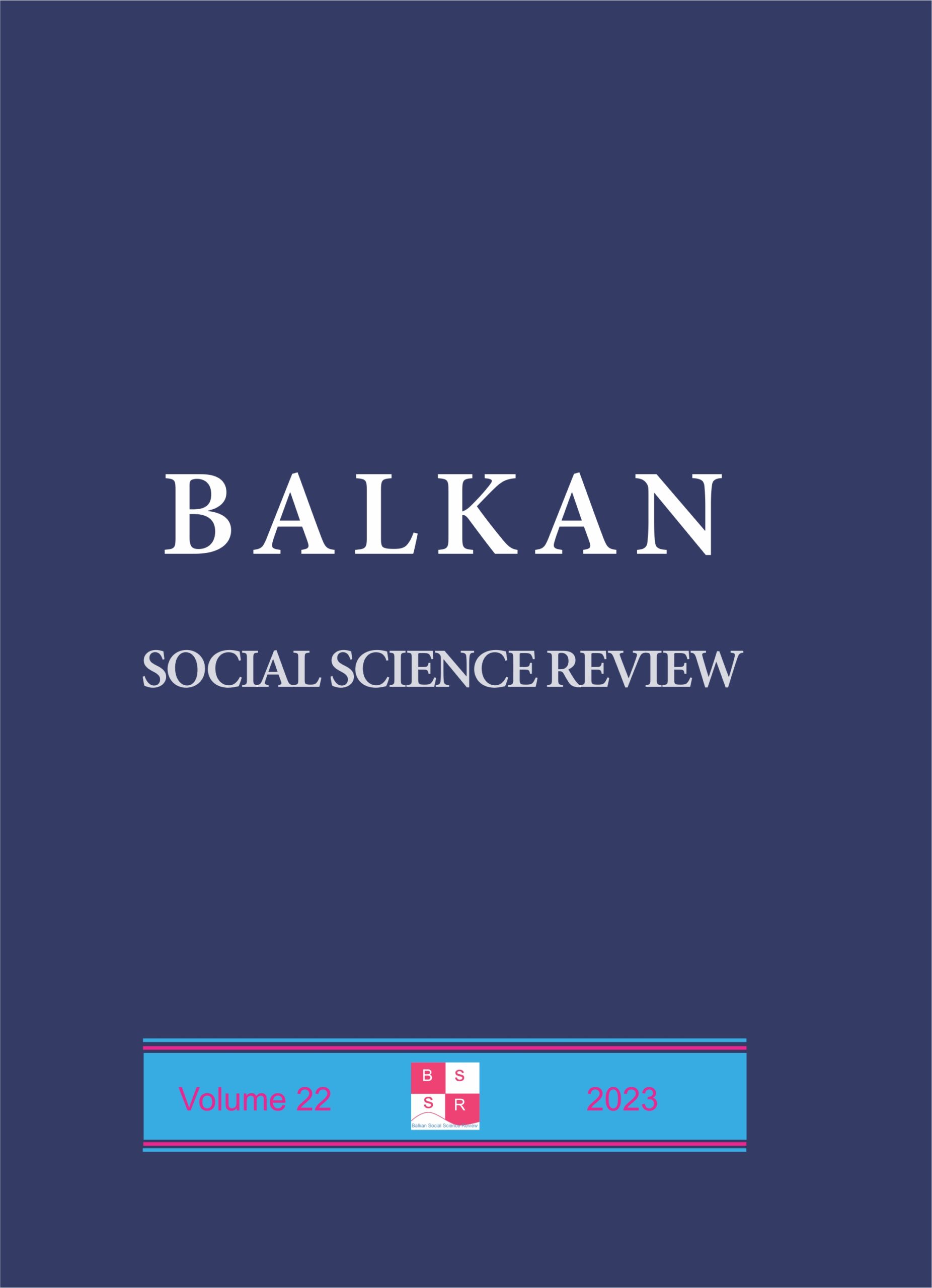
Understanding Social Realities of Internally Displaced Persons (IDPs) in the Federal Capital Territory of Nigeria (FCT), Abuja
Abstract:
This article examines the social realities of forcibly displaced persons in Nigeria, with a focus on internally displaced persons (IDPs) in the Federal Capital Territory (FCT) of Nigeria, Abuja. Internally displaced persons are individuals who have been forced from their homes or habitual places of residence and, unlike refugees, have not crossed the borders of their country. They remain under the primary protection of their governments and often seek refuge in their own countries. This study draws on secondary data sources and primary data collected from two IDPs campsites, arguing that most IDPs in the FCT, displaced by the Boko Haram insurgency live in makeshift and inhumane informal settlements in the peri-urban areas of Abuja City. These settlements also host the urban poor and other economic migrants in the country’s capital, occasionally leading to conflicts between them. The paper calls for the government to recognise the presence and condition of IDPs in the FCT and to work with relevant organisations to provide durable solutions to ensure that displaced persons can once again become productive members of society.
Cite this article:
BA-ANA-ITENEBE, C. A.; EDO, Z. O. (2023). Understanding Social Realities of Internally Displaced Persons (IDPs) in the Federal Capital Territory of Nigeria (FCT), Abuja. In: Balkan Social Science Review, Vol. 22, 213-231. https://doi.org/10.46763/BSSR232222213bai
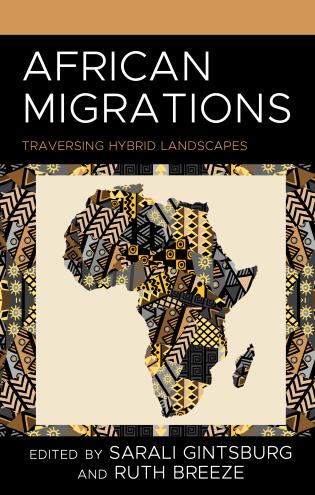
From Angola to Portugal: Narrating Migration, Memory and Identity in Djaimilia Pereira de Almeida’s Work
Abstract:
Based on the teoretichal perspetives of Lusophone Postcolonial Studies, in dialogue with other analytic tools from Feminist Studies, this chapter aims to explore the topics of migration, memory and identity through the close reading of two works of fiction by the Portuguese writer of African descent Djaimilia Pereira de Almeida (1982), who was born in Angola and grew up in Portugal. In the autofiction That Hair (Tin House, 2020; originally published in Portuguese as Esse Cabelo, 2015), as well as in the novel Lisbon, Luanda, Paradise (Lisboa, Luanda, Paraíso, 2018), the main characters move from Angola to Portugal for personal or family reasons and seek to redefine their identities. They give voice to memories and narratives that involve the relationships between the colonial past and the building of contemporary postcolonial identities. In particular, the chapter analyses the representation of both the place of orign and arrival to portray the complex socio-cultural and migratory identity landscapes that emerged during Portuguese colonialism, as well as following the decolonization in Lusophone Africa (1975). In this regard, incluiding also a brief reading of the most recent novel by Almeida, Maremoto (2018), the chapter pays special attention to the perceptions and experiences of the city of Lisbon by narrators and protagonists who are immigrants, in order to reflect on the contemporary configurations of a postcolonial city on the periphery of Europe.
Citation:
Falconi, Jessica (2024) “From Angola to Portugal: Narrating Migration, Memory and Identity in Djaimilia Pereira de Almeida’s Work” in S. Gintsburg & R. Breeze (eds) Afriacan Migration: Traversing Hybrid Landscapes. Lanham: Lexington Books, p. 15-35.
https://rowman.com/ISBN/9781666938708/African-Migrations-Traversing-Hybrid-Landscapes
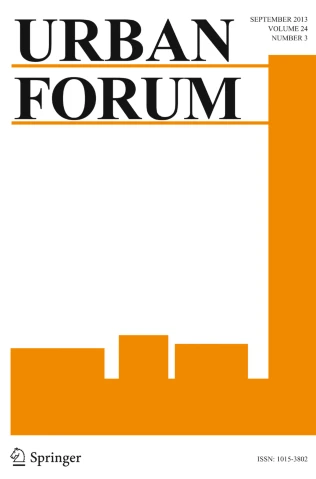
Armed Conflict and Urbanization in Cabo Delgado, Mozambique: A methodology for a critical inquiry
Abstract:
Mainstream urban theory fails to encompass urbanization in Africa. Among its many drivers, armed conflicts displace rural populations to cities, accelerating urban processes and impacting sustainability and governance — the phenomenon of conflict-induced urbanization. In the province of Cabo Delgado, a violent insurgency has been displacing thousands of civilians since 2017; many of whom have fled to the provincial capital Pemba, doubling its population in just 5 years. This article presents the theoretical framework and methodological design for an inquiry located within a contemporary critique of mainstream urban studies; the goal is to analyse conflict-induced urbanization in Pemba with a comparative case study, using participatory visual methods, for which a pilot study took place in September 2022. With this, the author aims to contribute to engaged urban studies in Mozambique and Portugal and to transform the trauma of war into opportunities for sustainable development and prosperity.
Cite this article:
Agostinho do Amaral, S. Armed Conflict and Urbanization in Cabo Delgado, Mozambique: A Methodology for a Critical Inquiry. Urban Forum (2023). https://doi.org/10.1007/s12132-023-09505-y
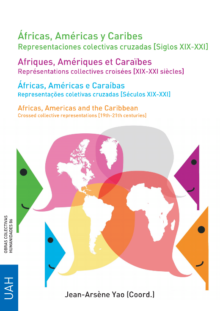
As (im) pertinências do método. Metodologia participativa e o estudo sobre a Afrodescendência em Portugal
Abstract:
The announcement of the Decade of African Descendants (2015-2024) by the UN, drew attention to the presence of African descendants in Europe, including in Portugal, as part of the contemporary social configuration of the continent. However, the focus on these people has been sustained, above all, in theories and representations of subalternity and exclusion that do not recognize them as new political subjects in a Europe that is no longer black and white. These politically hybrid subjects, in the historical and cultural sense, bring theoretical-epistemological and methodological challenges to the social sciences, since their visions, paradigms and ways of living escape the traditional lenses of the approaches that associate them with immigrants or refugees. We propose that in approaching the subject of Afrodescendence, method is central and determinant of the outcomes, ethical function and meaning of social research on emerging contemporary subjects. We argue in favour of participatory methodology, reflecting on its pertinence in a context where the people in the researched situation are critical subjects in their fields of intervention/action who reject being reduced to mere objects of study. We analyse the processes of negotiation in the field concluding on the contribution of this project to the dialogue between academics and the afrodescendant collectives. As (im)pertinências do método. Metodologia participativa e o estudo sobre a Afrodescendência em Portugal is inserted in the debate on the democratization of knowledge, sustained, in particular, by critical perspectives that are based on studies on emerging contemporary subjects.
Quotation:
Évora, Iolanda. “As (im)pertinências do método. Metodologia participativa e o estudo sobre a Afrodescendência em Portugal”, In: Yao, Jean-Arséne, Victorien Lavou Zoungbo et Luis Mancha San Esteban, eds. Forthcoming. Representations collectives croisées: Afriques, Amériques et Caraibes. Xix-xxi siècles. III GRELAT. Actas do Colóquio. Madrid: UAH Editora, 167-176. ISBN:978-84-18254-12-3.
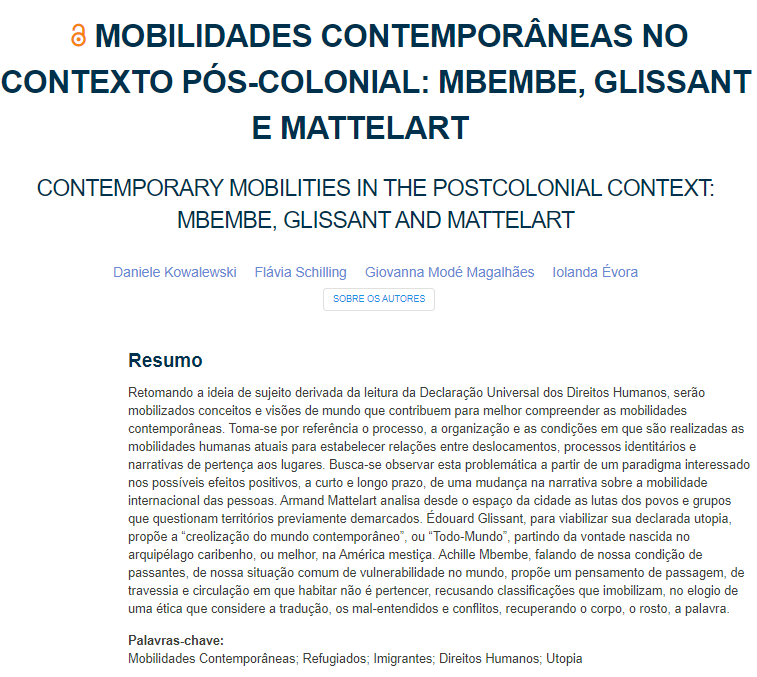
Mobilidades Contemporâneas no Contexto Pós-Colonial: Mbembe, Glissant e Mattelart
Abstract:
Taking up again the idea of subject derived from the reading of the Universal Declaration of Human Rights, concepts and worldviews will be mobilized that contribute to better understand contemporary mobilities. Reference is made to the process, the organization and the conditions in which current human mobilities are carried out to establish relationships between displacement, identity processes and narratives of belonging to places. In Mobilidades Contemporâneas no Contexto Pós-Colonial: Mbembe, Glissant e Mattelart we seek to observe this problematic from a paradigm interested in the possible positive effects, in the short and long term, of a change in the narrative on the international mobility of people. Armand Mattelart analyses, from the space of the city, the struggles of peoples and groups that question previously demarcated territories. To make his declared utopia viable, Édouard Glissant proposes the “creolisation of the contemporary world”, or the “All-World”, starting from the will born in the Caribbean archipelago, or rather, in mestizo America. Achille Mbembe, speaking of our condition of passers-by, of our common situation of vulnerability in the world, proposes a thought of passage, of crossing and circulation in which to inhabit is not to belong, refusing classifications that immobilise, in praise of an ethic that considers translation, misunderstandings and conflicts, recovering the body, the face, the word.
Quotation:
“Kowalewski, Daniele, Schilling, Flávia, Magalhães, Giovanna Modé, & Évora, Iolanda. (2019). Mobilidades Contemporâneas no Contexto Pós-Colonial: Mbembe, Glissant e Mattelart. Lua Nova: Revista de Cultura e Política, (108), 137-156. Epub November 28, 2019. https://doi.org/10.1590/0102-137156/108“

Diáspora Cabo-Verdiana: Temas em debate
Abstract:
The idea of this collection originates from the interest in retaining in the same work important themes that are currently under debate and that the social sciences have been addressing regarding the Cape Verdean diaspora. From specific theoretical fields and their own empirical work, the authors choose the Cape Verdean diaspora society as their object, exploring dynamics that together make up the Cape Verdean diasporic space and describe the complexity inherent to its constitution. We aimed at gathering contributions that are not only concerned with mapping the current global dispersion of Cape Verdeans (including the second third resettlements in locations such as, for instance, the Schengen area, after the insertions of the first Cape Verdeans in Europe) but, above all, with deciphering the complex processes of diasporisation. We hope that Diáspora Cabo-verdiana: temas em debate will contribute to reinforce the attention of social scientists regarding the ways in which the Cape Verdean diaspora is constituted in temporal and spatial terms, the engagement of communities among themselves and with Cape Verde, knowing that this, in turn, also experiences, in its temporal and spatial structure, new ways of remembering, imagining and engaging its diaspora today.
Quotation:
Évora, Iolanda (coord.) /2016). Diáspora Cabo-verdiana: temas em debate. Lisboa: CEsA – Centro de Estudos sobre África, Ásia e América Latina.
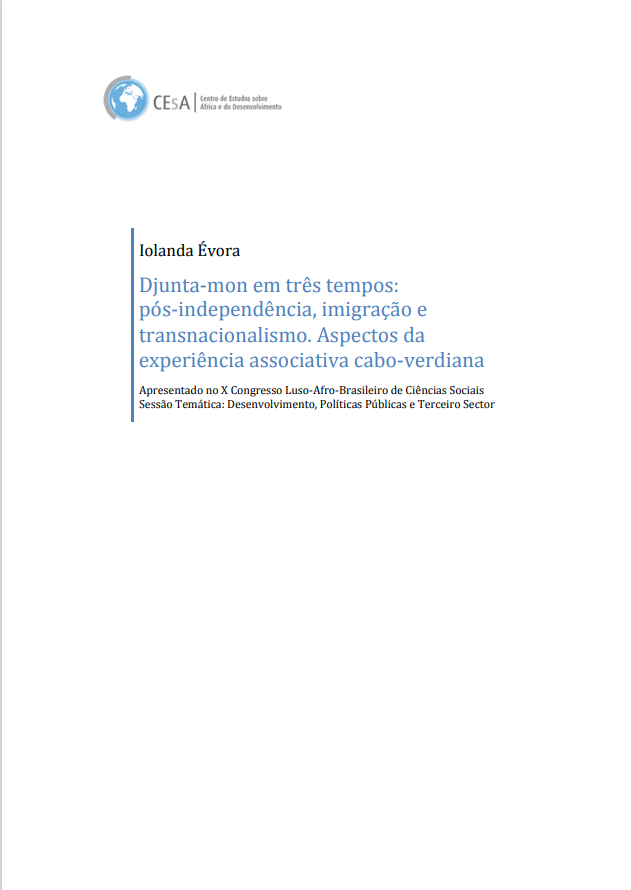
Djunta-mon em Três Tempos: Pós-independência, imigração e transnacionalismo. Aspectos da experiência associativa cabo-verdiana
Abstract:
Djunta-mon em três tempos: pós-independência, imigração e transnacionalismo. Aspectos da experiência associativa cabo-verdiana focuses on voluntary associations and discusses the material and psychosocial conditions of membership and participation of members. These aspects are analyzed from the point of view of the members of cooperatives in the rural area of the island of Santiago, created in the post-independence period, and of Cape Verdean immigrant associations in Portugal. In Santiago, we identified both singular forms of appropriation of the official ideological base and governmental objectives, as well as cultural permanences that, through practices such as djunta-mon, ensure the protection of social identities and allow familiarity and subjective control of this social practice. . In immigration, spontaneous associations propose to maintain identity, promote social inclusion or solve common problems and needs and reflect the heterogeneity, social cleavages and class divisions of origin that are reproduced in immigration. Currently, formal demands for greater rigor and technical and human competence in its functioning seem to weaken spontaneous and voluntary adhesion and the djunta-mon. At the same time, it questions the traditional role of these associations in the face of changes in immigration with the inclusion of new profiles such as transnational migrants. We examine the adaptability of this collective strategy, indicating that in the past, in the present and in the face of the possibility of a transnational associative practice, the use of the traditional djunta mon adapted to the lived context, ensures the maintenance of the strong network of reciprocity and sociability essential to survival and success. of the associations.
Quotation:
Évora, Iolanda. 2011. “Djunta-mon em três tempos: pós-independência, imigração e transnacionalismo. Aspectos da experiência associativa cabo-verdiana”. Comunicação apresentada no X Congresso Luso-Afro-Brasileiro de Ciências Sociais, Sessão Temática Desenvolvimento, Políticas Públicas e Terceiro Sector
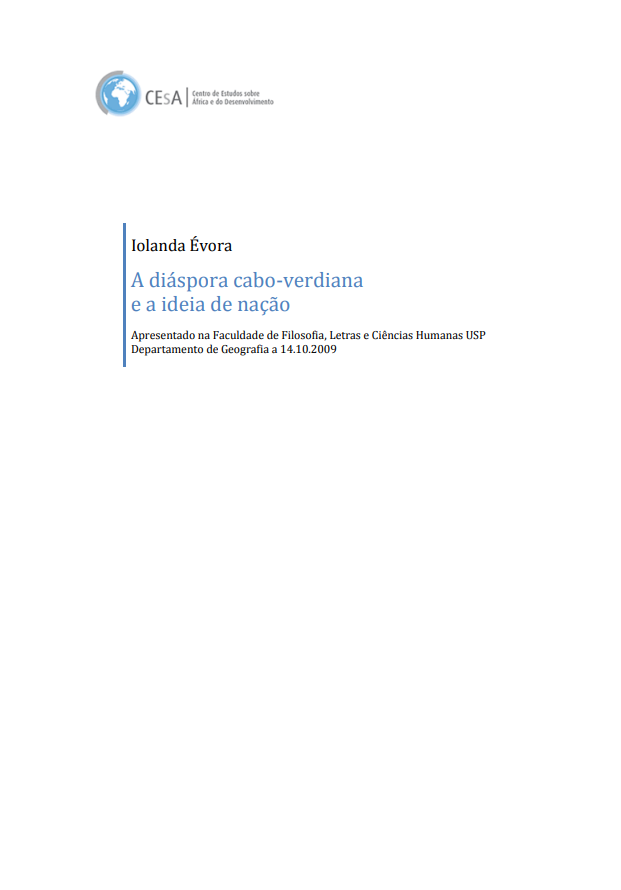
A Diáspora Cabo-verdiana e a Ideia de Nação
Abstract:
Starting from the notion of place as a horizon of connections, of productions of meanings and of struggles, the perspective we adopt highlights, on the one hand, a series of issues that have been little addressed, and, at the same time, shows its potential in the re-elaboration of the migratory phenomenon as a whole (which includes, for example, a psychosociology of the place of origin as a fundamental part of a diaspora nation as well). In addition to this interest from a social and academic place, there is no doubt that the topic “diaspora and nation”, when referred to Cape Verde, already arouses interest, that is, it is an impertinent (because provocative) subject, if we think about the mismatch between the geographical territoriality of the country (ten islands and 4033 km2 ) and the national (the islands and the diaspora). This means that it immediately indicates a challenge because geographical proximity is not adopted here as the criterion for defining a nation. On the contrary, in the case of Cape Verde, it is stated that the nation, in its definition, is only attainable if one also considers those who are physically distant from the territorial place called Cape Verde. A diáspora cabo-verdiana e a ideia de nação was delivered at the Faculdade de Filosofia, Letras e Ciências Humanas USP Departamento de Geografia on 14.10.2009.
Quotation:
Évora, Iolanda. 2011. “A diáspora cabo-verdiana e a ideia de nação”. Comunicação apresentada na Faculdade de Filosofia, Letras e Ciências Humanas, USP Departamento de Geografia, Brasil.
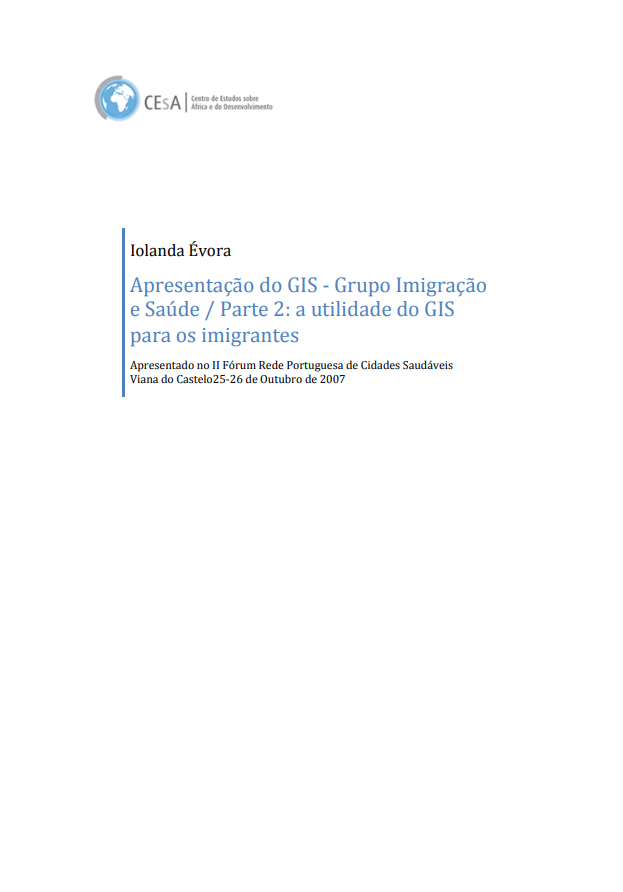
Apresentação do GIS – Grupo Imigração e Saúde Parte 2: A utilidade do GIS para os imigrantes
Abstract:
GIS (Immigration and Health Group) proposes the involvement (virtual and real) of people, public and private institutions which, by their professional activity, develop research projects and tasks related to the health of the immigrant population. At this moment, GIS is already a reference as a privileged and credible source of information on health/immigration initiatives. With its functioning model – decentralised action, provided by the network structure, in which initiatives are suggested by all – it has promoted an intense exchange, which in the field of immigration and health, is perhaps unprecedented in Portugal, if we think of the scale of its reach and the number of members of the group. This exchange is made between its members, whose actions may be academic or more practical, therefore, of intervention in the field. An analysis of the profile of the GIS members shows that a significant part of them deal with the immigration/health theme at both possible levels of action, either at the academic or practical level of intervention. Because of this profile, and because GIS promotes the meeting of people and their institutions at both levels, we can say that GIS is an important practical-reflective proposal, therefore, an important contribution to a more reflected intervention and a reflection closer to reality, when it comes to immigration/health. Apresentação do GIS – Grupo Imigração e Saúde Parte 2 : a utilidade do GIS para os imigrantes was given at the II Forum Portuguese Healthy Cities Network Viana do Castelo 25-26 October 2007.
Quotation:
Évora, Iolanda. 2011. “Apresentação do GIS – Grupo Imigração e Saúde Parte 2 : a utilidade do GIS para os imigrantes”. Comunicação apresentada no II Fórum Rede Portuguesa de Cidades Saudáveis, Viana do Castelo.





